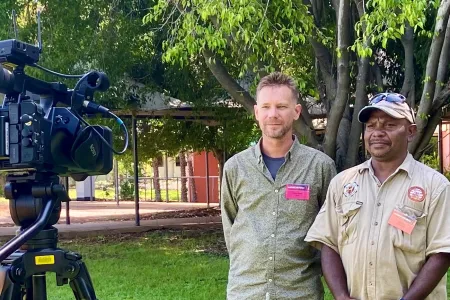NEWS ARTICLE
Australia’s big burning issue tackled in the north
As Australia grapples with unprecedented wildfires that have caused widespread devastation over summer, the success of Indigenous fire management in the north has gained renewed attention.
Bringing together their traditional knowledge with modern science and technology, Indigenous fire managers have cut uncontrolled bushfires by half, lowered the nation’s greenhouse gas emissions and provided much-needed employment in some of the remotest parts of the country.
Those involved in the industry recently met in Darwin from February 18 - 19 as part of the annual Savanna Fire Forum - the largest gathering of fire managers in Australia.
The two-day forum, held at Charles Darwin University, brought together more than 300 people working in the industry, from Indigenous land managers to top scientists and government policy makers.
Indigenous Carbon Industry Network steering committee member and Tiwi Land Council senior ranger Willie Rioli said it’s an important opportunity for the groups to get together to share experiences, lessons and discuss the future. “Our fire management is a big success story and one that Aboriginal people feel strong and proud about,” Mr Rioli said.
“We know how to manage fire to look after country and it’s good our cultural knowledge of the land and our work with scientists is being recognised and keeps growing every year. “Fire management helps our plants and animals as well as the world’s climate. It’s important we continue the work, keep looking to improve - and we’re happy to share our knowledge with people.”
Over the past decade, Indigenous fire managers in northern Australia have altered the pattern of destructive late dry season fire through the application of the savanna burning methodology. Hailed as a world-first when developed in 2006, savanna carbon farming methods have sparked a multi-million dollar industry with major environmental, social and cultural benefits. Australia’s Indigenous carbon industry now includes 29 savanna fire projects managing more than 17 million hectares of savanna woodland and grassland across the north.
Charles Darwin University Centre for Bushfire Research fire ecologist Rohan Fisher said the fire management approach has been so successful it’s being adopted in countries around the world.
“Our research shows the area of hot, late dry season fires across northern Australia has halved over the past 15 years and the area of all fires has dropped close to a quarter,” Mr Fisher said.
“The frequency of fires has been reduced over an area the size of Germany, or one and a half times the size of Victoria.
“The shift has been driven by early dry season burning undertaken by land managers and comes despite worsening fire weather conditions brought about by climate change.
“This last fire season has been particularly tough for everyone across Australia facing drought, hot weather and winds, so this work is important now more than ever.”
Mr Rioli said that while Australia’s southern states had a different ecology and greater population than the north, there were important lessons that could be shared. “Fire is a tool and it’s something people should see as part of the Australian landscape,” Mr Rioli said.
“By using fire at the right time of year, in the right places with the right people, we have a good chance to help country and climate. “Importantly, people need to listen to science - the success of our industry has been from a collaboration between our traditional knowledge and modern science and this cooperation has made our work the most innovative and successful in the world.”
Related Articles

First “hype cycle” of AI development put tech above humans
Users around the world have rushed to adopt artificial intelligence - especially in safety-critical fields - but a new study has revealed the hype has prioritised technology for technology’s sake instead of human-centred development.
Read more about First “hype cycle” of AI development put tech above humans
Nanoplastics hindering cognitive abilities of fish, international research shows
Nanoplastic exposure can impair the cognitive abilities of fish and could lead to significant impacts on marine species’ ability to survive, according to a new international study.
Read more about Nanoplastics hindering cognitive abilities of fish, international research shows
Eradication would cost billions: NT’s lessons for Pilbara’s cane toad management
Cane toads are predicted to invade Western Australia’s Pilbara region by 2041 if left unchecked, but the Northern Territory’s population of the pests hold key lessons that could save billions in eradication costs.
Read more about Eradication would cost billions: NT’s lessons for Pilbara’s cane toad management
